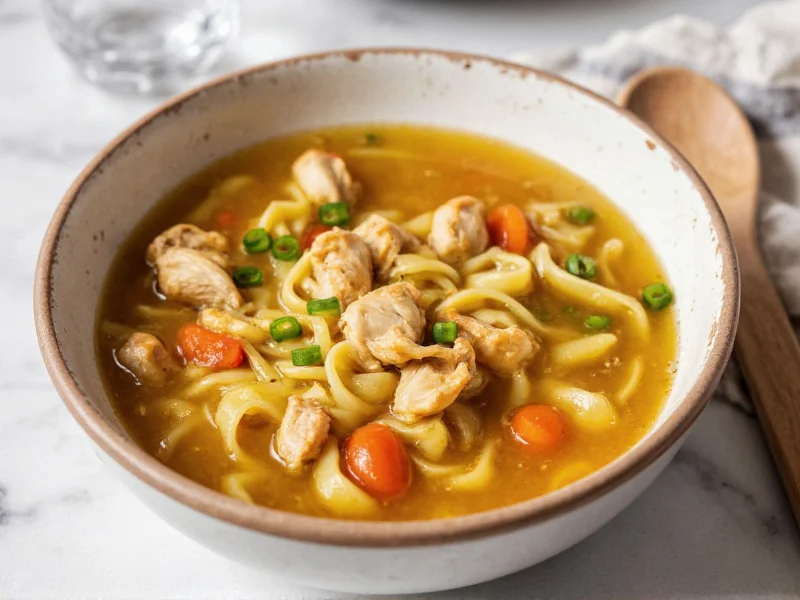For generations, chicken noodle soup has been prescribed as a remedy for colds and flu. But does this traditional comfort food actually deliver measurable health benefits, or is it merely an old wives' tale? Modern research reveals that chicken noodle soup contains specific properties that genuinely support the body during respiratory illnesses.
The Science Behind Soup's Healing Properties
Multiple studies have investigated why chicken noodle soup seems particularly effective for cold symptoms. Research published in Chest journal found that chicken soup inhibits neutrophil migration, a process that contributes to inflammation in the upper respiratory tract. This anti-inflammatory effect helps explain why many people experience reduced congestion and improved breathing after consuming chicken soup.
The steam from hot soup helps loosen mucus and clear nasal passages, while the warm liquid promotes hydration—critical when fighting illness. Dehydration worsens symptoms like headache and fatigue, making the fluid content of soup particularly valuable during illness.
Nutritional Components That Support Recovery
Traditional chicken noodle soup contains several elements that contribute to its health benefits:
| Ingredient | Health Benefit | Scientific Basis |
|---|---|---|
| Chicken broth | Provides electrolytes and hydration | Contains sodium, potassium, and magnesium that help maintain fluid balance |
| Chicken protein | Supports immune function | Provides amino acids like cysteine that may help thin mucus |
| Vegetables (carrots, celery) | Antioxidants and vitamins | Rich in vitamins A and C which support immune health |
| Warm temperature | Reduces inflammation | Heat helps decrease nasal congestion and soothe sore throats |
Chicken Soup and Immune Function
While chicken noodle soup won't cure a cold, it creates optimal conditions for your immune system to function effectively. Proper hydration ensures your mucous membranes stay moist, creating a better barrier against pathogens. The nutrients in homemade chicken soup—particularly when made with bone broth—provide building blocks that support white blood cell production.
A study from the University of Nebraska Medical Center found that homemade chicken soup demonstrated anti-inflammatory activity in laboratory tests. The researchers noted that "the significance of these results is unclear, but the study provides a scientific basis for the value of chicken soup as a cold remedy."
Homemade vs. Store-Bought: Does It Matter?
When examining nutritional value of homemade chicken soup versus commercial varieties, significant differences emerge. Homemade versions typically contain more protein, fewer preservatives, and higher concentrations of beneficial compounds. Commercial soups often contain excessive sodium and artificial ingredients that may counteract some health benefits.
For maximum health benefits, prepare soup with:
- Homemade bone broth (simmered for 12-24 hours)
- Fresh vegetables (carrots, celery, onions, garlic)
- Lean chicken meat
- Minimal added salt
- Optional immune-boosting additions like ginger or turmeric
Limitations of Chicken Noodle Soup as a Remedy
It's important to understand that while chicken noodle soup offers symptomatic relief, it doesn't shorten the duration of viral infections. The chicken noodle soup health benefits are primarily supportive rather than curative. It won't replace medical treatment for serious conditions, and shouldn't be relied upon exclusively for severe illnesses.
For individuals with specific health conditions like hypertension, the sodium content in some soups may be problematic. Those with food allergies or sensitivities should modify recipes accordingly to avoid adverse reactions while still gaining benefits.
When to Seek Medical Attention
While chicken soup provides comfort, certain symptoms require professional medical care. Seek medical attention if you experience:
- Fever above 103°F (39.4°C) lasting more than 3 days
- Difficulty breathing or shortness of breath
- Chest pain or pressure
- Symptoms lasting longer than 10 days without improvement
- Severe dehydration symptoms
Chicken noodle soup serves as an excellent complementary approach to conventional medical care for mild respiratory illnesses, but shouldn't replace professional treatment when needed.
Creating the Most Therapeutic Chicken Noodle Soup
To maximize the chicken soup anti-inflammatory properties, consider these evidence-based preparation tips:
- Use bone-in chicken parts to extract collagen and gelatin during long simmering
- Add garlic and onions, which contain compounds with antimicrobial properties
- Include turmeric or ginger for additional anti-inflammatory benefits
- Use minimal salt and avoid excessive fat
- Add leafy greens like spinach or kale near the end for extra nutrients
- Keep noodles or rice to moderate portions to avoid excessive carbohydrates
The traditional Jewish penicillin nickname for chicken soup isn't entirely scientific, but the scientific evidence chicken noodle soup health benefits is more substantial than many realize. When prepared thoughtfully, it provides hydration, nutrition, and symptomatic relief that genuinely supports the body's healing processes during respiratory illnesses.











 浙公网安备
33010002000092号
浙公网安备
33010002000092号 浙B2-20120091-4
浙B2-20120091-4